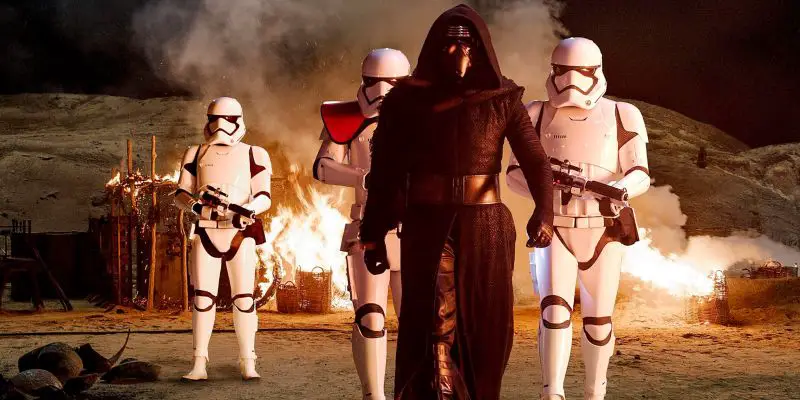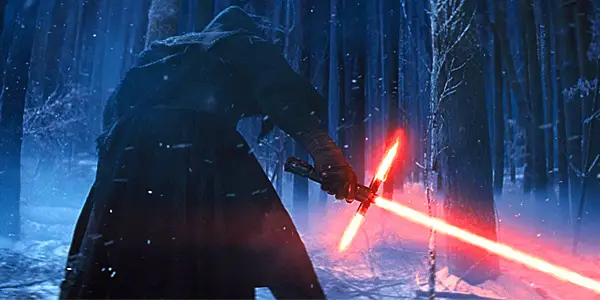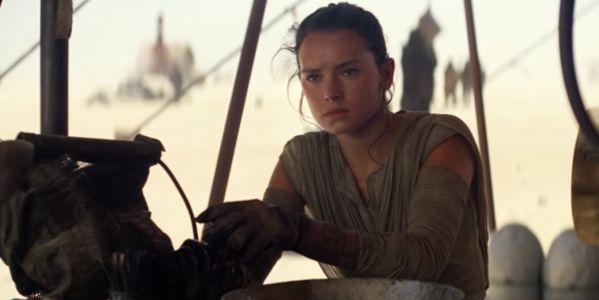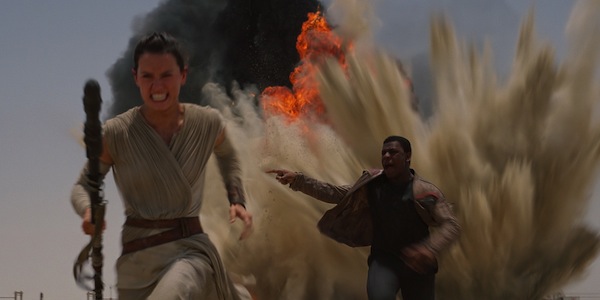STAR WARS: THE FORCE AWAKENS: The Force is Strong With This One

Alistair is a 25 year old writer based in Cambridge.…
The cyclical nature of contemporary pop culture means that for every blockbuster released, a backlash is likely imminent over the course of its opening weekend, no matter how good the reviews. JJ Abrams knows better than anybody about the perils of falling victim to the hype train; despite critical and commercial success, mere weeks after its opening his Star Trek sequel Into Darkness was voted the worst Trek film of all time at a leading Trekkie convention.
Taking fanboy rage on the chin, he has decided to follow this minor outrage by taking the directorial reigns of the new instalment of one of the most beloved franchises at all time, as audiences worldwide wait with bated breath to see whether or not he has (to use a common expression) “raped their childhood”.
I have no idea whether or not a backlash is going to materialise over the next few days, but as the still silence of the world-famous opening title card gave way to John Williams’ classic booming score for the first time, more than one person at my screening immediately burst into spontaneous applause. From there, with The Force Awakens, Abrams makes the Star Wars movie every fan wants to see, and it succeeds effortlessly at doing more than merely cashing in on nostalgia.
Abrams shows more love for the franchise than Lucas Himself
This is firmly in the Star Wars DNA, but Abrams has a knack for storytelling that has forever alluded George Lucas. The characters he writes are emotionally engaging and genuinely witty, not the walking exposition machines that populated the films Lucas either wrote or directed. As Abrams reintroduces a multitude of classic characters, he gives them the love and attention that makes me finally understand why they were so revered in the first place. Even if there is a Phantom Menace-style backlash (which seems entirely inexplicable to me), I can’t ever discredit Abrams for making the film that has finally got me on the same page as everybody else: loving Star Wars.
In the years since Return of the Jedi, Luke Skywalker has gone missing and the galaxy has pretty much gone to shit. The dissolution of the Galactic Empire has given way to an even more deadly foe, The First Order, a government far more fascistic than their predecessors. It is commanded by Kylo Ren (Adam Driver) the most purely evil villain the franchise has yet produced; under the orders of him and his propaganda-spouting General Hux (Domhnall Gleeson) multiple acts of genocide are committed at the blink of an eyelid, in what are undoubtably the darkest scenes ever produced by the franchise.
Deciding enough is enough, stormtrooper Finn (John Boyega) desperately hitches an escape plan with a captured resistance member Poe Dameron (Oscar Isaac) as he learns about the quixotic mission he has been sent on by the newly dubbed General Leia: to find Luke Skywalker, who, it isn’t a spoiler to say, is merely a McGuffin for the events of the film and is far more likely to play a central part in impending sequels.

Crashing down on the Desert planet Jakku, Finn is stranded from his escape partner and is somewhat hesitant to continue this mission alone (he is, after all, still regarded as a stormtrooper). Taking the jacket of his partner, he is spotted by BB-8, Poe’s droid that flees with the map to Luke following Poe’s capture; avoiding certain death, he lies that he’s a part of a resistance and as stormtroopers start attacking the settlement, flees with badass heroine Rey (Daisy Ridley) to the resistance settlement elsewhere in the galaxy.
The new characters are instantly loveable: Finn is the audience surrogate, a bumbling idiot who is escaping from the clutches of his evil mentors one mistake at a time. BB-8 (voiced, weirdly, by Bill Hader and Ben Schwartz) is going to send young audiences not terrified by the genuine menace of The First Order, whose war speeches look alarmingly like Nazi rallies, into a dizzy fit, forcing their parents to the latest toy store to get them one in time for Christmas in ways not dissimilar to Jingle All the Way.
But the true star making performance is from Daisy Ridley, the Skywalker to Finn’s Solo, her status as an orphan lingering in poverty renders her arc not entirely dissimilar to Luke’s. She is a badass intergalactic warrior, but has a very human vulnerability that makes her so compelling and hopefully an enduring franchise favourite.
On the less than loveable but even more compelling side is Adam Driver as Kylo Ren. To talk in-depth about this character risks flirting with spoilers, but his frequent temper tantrums mixed with his genuine menace proves unforgettable; you are always left uncertain as to whether he is incompetent at villainy or merely bluffing. This is perfect casting; beneath his mentally unhinged persona on HBO’s Girls lies a character as unstable as Ren.
What is remarkable about The Force Awakens is that even with multiple narrative threads, it only ever feels convoluted when reading back a plot synopsis; this is effective storytelling, that effortlessly introduces a plethora of new characters and makes you care about them, even as their number should be overwhelming. Lucas was a poor storyteller as even in his most highly regarded work, he still repeatedly broke the vital filmmaking rule of “show, don’t tell”. He opened his inaugural work on the franchise with a sizeable chunk of scrolling text exposition, a poor storytelling device that nostalgia has now rendered a cinematic milestone.

Abrams, although utilising that nostalgia here, doesn’t need to. He establishes the plot by showing and not telling, with characters frequently engaging in conversational dialogue that makes the universe feel more “lived-in” and the characters feel more like palatable living beings and not just walking plot mechanisms.
A franchise movie that feels like a personal one
So even though I’ve never been a fully-fledged member of the Star Wars bandwagon, the love Abrams has for these characters and this universe is undeniably infectious. Much like Guillermo Del Toro and the Kaiju movies he revered that influenced Pacific Rim, Abrams’ clear love for his influences (no matter how comparatively weak their merits may be) proves irresistible, converting me based on the sheer passion and love he tells the story with: a tentpole blockbuster that doubles as a film deeply personal to its creator.
As well as being a worthy addition to the Star Wars canon, it also works as a companion piece to Abrams’ Spielberg homage Super 8; whereas that film had its detractors due to being so obvious in its pillaging of Spielbergian tropes, The Force Awakens isn’t so much a homage to George Lucas as it is an idealised version of a George Lucas movie.

JJ Abrams is now firmly in the Christopher Nolan league of being a genuinely intelligent blockbuster director, whose mega-budget hits are still interesting passion projects. To call it a homage to George Lucas seems detrimental; with its retina-destroying lens flare, its rapidly shifting camera work and priorities of witty banter over convoluted plot exposition, The Force Awakens is unmistakably a JJ Abrams movie.
Lucas was frequently humourless, his idea of jokes in the prequels summed up easily by bizarre racism and fart gags, whilst he seldom managed to get performances out of his actors that were emotionally affecting, with dialogue readings often proving stilted and indifferent. When different directors took the reigns for The Empire Strikes Back and Return of the Jedi, the two best films in the canon were produced, proving that you could easily polish a screenplay if you apply emotional investment over the need to make money.
With no George Lucas involvement for the first time in the franchise, the film plays as love letter to the original trilogy in a way that doesn’t feel cynical; new characters wax lyrical over the stories they were told about Luke Skywalker, Han Solo and Princess Leia as children, believing them to be nothing more than myths.

When Han and Chewbacca finally appear, I felt a surge of nostalgia equal to everybody onscreen; Abrams reminds you why these characters are important to so many people, but doesn’t let their performances or character arcs flounder by on sheer admiration. Han’s arc is the most emotionally affecting of the film, proving that Harrison Ford may be the only actor alive who is better when he is clearly only doing it for the money.
As an ageing Han, Ford is a cantankerous old space-xenophobe, his annoyance at other characters doubling up as Ford’s own annoyance at having to film yet another Star Wars movie. Yet as Han and Chewie first arrive on the stolen Millennium Falcon, the delight in Ford’s eyes as he says “we’re home” looks genuine, a scene to make even the most hardened of hearts feel their eyes start to swell up with tears of happiness.
Conclusion
This is a movie that feels like more than mere fan fiction, no matter how many classic characters are reintroduced or how many fan queries are directly responded to (a recurring gag of Finn being confused why humans, droids and Wookies understand each other despite never speaking the same language). It pushes the stories of everybody forward at an electric rate, unafraid to make the universe darker on the journey. The lack of a concrete conclusion suggests the first trilogy in the franchise where all the stories are directly connected.
It is a monumental blockbuster achievement, one that will not instantly be regarded that way due to the wave of hype surrounding it, but to the dual achievement of taking brave risks that are going to result in severe audience emotional casualties and equally paying lip service to the trilogy fans know and love, the Force is truly strong with this one.
Does The Force Awakens live up to the hype, or is it a Phantom Menace-style disaster?
The Force Awakens is out now everywhere. It is the reason your local cinema isn’t going to be playing any other films for about a month.
Does content like this matter to you?
Become a Member and support film journalism. Unlock access to all of Film Inquiry`s great articles. Join a community of like-minded readers who are passionate about cinema - get access to our private members Network, give back to independent filmmakers, and more.
Alistair is a 25 year old writer based in Cambridge. He has been writing about film since the start of 2014, and in addition to Film Inquiry, regularly contributes to Gay Essential and The Digital Fix, with additional bylines in Film Stories, the BFI and Vague Visages. Because of his work for Film Inquiry, he is a recognised member of GALECA, the Gay & Lesbian Entertainment Critics' Association.













